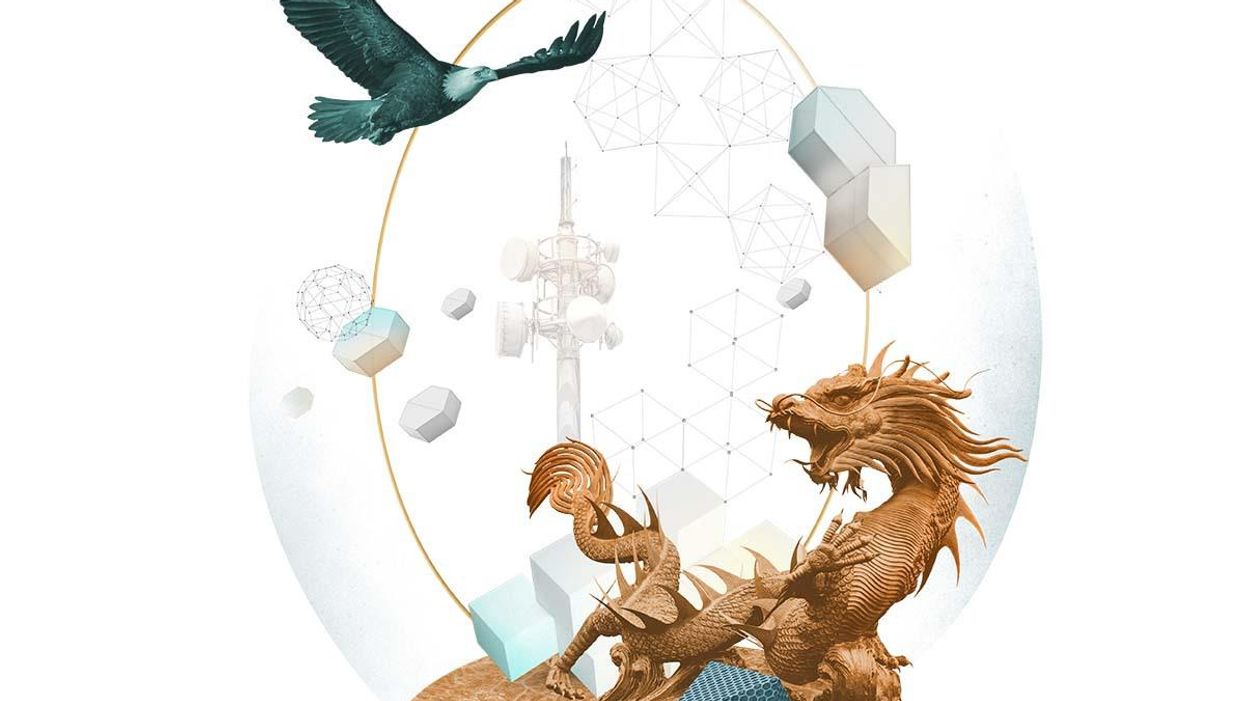
Episode 6: Common prosperity, coal, and competitiveness: The US and China (part II)
Listen: The relationship between the US and China is rapidly evolving. Economic and political decisions made today will impact power dynamics in both the near and long term. We'll examine the Chinese government's plans to shape industries, continue its domestic growth, and deliver on commitments made to reduce greenhouse gas emissions. Plus, we'll explain what those decisions may mean for Chinese and US investors in the near future.
Transcript: Season 2, Episode 6: Common prosperity, coal, and competitiveness: The US and China (part II)
Disclosure: The opinions expressed by Eurasia Group analysts in this podcast episode are their own, and may differ from those of Citigroup Inc and its affiliates.
Caitlin Dean: Welcome to Living Beyond Borders, the podcast from Citi Private Bank and GZERO Media that examines the risks and opportunities in our rapidly changing world, from global politics to economics and what it all means for you. I'm Caitlin Dean, head of the Geostrategy Practice at Eurasia Group.
In the last episode of Living Beyond Borders, we looked at the latest developments, economic and political, between the US and China today. In part two of this special series, we'll dive back into the conversation to hear about where the two countries go next. Joining me are Steven Lo, co-head of Citi Global Wealth for Asia Pacific, David Bailin, chief investment officer and global head of investments at Citi Global Wealth, and Ian Bremmer, president at Eurasia Group and GZERO Media. Let's dive back in.
Steven, President Xi is using the banner of Common Prosperity to explain many of his policy changes like restrictions on video gaming and a clamp down on for-profit education companies. He's also tightening his grip on Hong Kong and potentially changing China's rules in Macau. What do you make of all of these changes coming at once under this idea of Common Prosperity?
Steven Lo: I'm glad you mentioned Common Prosperity as President Xi’ a key policy plan for the next phase for China's development. The concept of Common Prosperity is not new. Deng Xiaoping also used the concept as the ultimate goal of a Chinese socialism at a time when China started its reform, in opening a policy in the early 1980s. However, Deng took a pragmatic approach by encouraging a few groups of people to get rich first.
As China has finally eliminated absolute poverty in 2020, they would turn their focus on reducing income inequality and working on Common Prosperity. From President Xi’s recent article published in a flagship party publication, Qiushi, meaning “seek the truth.” He doesn't seem to be in a hurry to achieve this goal overnight. As this is a long-term goal, Common Prosperity should be achieved step by step. He also says Common Prosperity is not equality, and he doesn't think China should become a welfare state like some Western economies.
China would like to see its income distribution become olive-shaped, with the middle income group dominating the large and expanded middle, and the low and high income groups typically smaller at the two tips of an olive. I understand this concept, together with the recent anti-monopoly and other regulatory title and policy actions appear to many as targeting the private sector. This notion has created some anxiety among the wealthy individuals in Chinese society. There are concern that the government will use the third mechanism of distribution to force them to donate their wealth to fund charity programs. On this very point, the Chinese entrepreneurs are reassured repeatedly by President Xi and other senior Chinese official that such donation are meant to be voluntary, and by no means will a third mechanism of distribution be forced upon them.
Caitlin Dean: So David, some of these Common Prosperity reforms look similar to efforts that China has tried in the past. Will this time be different?
David Bailin: So this time is different. When you think about Common Prosperity, I think that it now has great specificity, because we're talking about Common Prosperity in the age of technology and Common Prosperity when it's actually much harder to do. What China has seen is exactly the same thing that the US has seen in the creation of wealth in its economy through technology, through innovation, through entrepreneurship, through venture capital. It's gone through everything that the US has gone through over the last decade and is looking at the outcome and is saying, "This is not for us." At least not in the way that it's been going. We don't want to create billionaires one a week. We don't want to create a thousand centimillionaires over the course of the next five years. We simply find that unacceptable that there would be this incredible disparity.
David Bailin: So I think that the five year plan now has to be considered materially different. And of course, we'll see how it's done. In order for China to focus domestically, it can't invest in as much in belt and road that I think, from a competitive standpoint for the West, could be considered an advantage because it had it done. So I think China could have owned a very large swath of the international markets. Instead, what we're going to see is much more global competitiveness between the West and the East, and that actually will be good for everyone ultimately because China will not be able to buy its buyers, if you will. It will not be able to fund the countries that will then buy its goods to the degree that it was going to before.
And then secondly, a lot of the policies that will now focus domestically on continuing to have more stimulus associated with getting people to buy domestically, whether it's a luxury good or a simple consumer good, more manufacturing of those goods and more of a supply chain where China is focused on developing more capacity to serve its own economy. And this focus on its own economy, I think, is going to be a very different way of looking at its quote, five-year plan. And then lastly, when we think about the repositioning, the only risk that I see to all of that is that, in the event that global growth slows significantly, China is not going to be willing to see its share of exports move to the other Southeast Asian countries. They're going to want to defend their share of the export market very, very heavily.
And this could have implications for the Chinese currency, which could become less valued. And if it did, that again would be put pressure on China and on all of its Southeast Asian competitors. And that certainly is a probable outcome because the slowing of the economy is something one doesn't control. But I would say that if we saw global growth slow disproportionately at the end of 2022 and into 2023, then China would actually have to take steps to make sure that its share of the export market stayed high, and in doing so I think that would be a bit of a flash point for the world economy.
Caitlin Dean: Ian, I'd love your thoughts here as well. So what are some of the elements of China's new five-year plan, and what will President Xi emphasize as he seeks, effectively, a life term?
Ian Bremmer: Well, it's interesting. In the last five, 10 years, Xi Jinping has talked a lot more about China effectively becoming a world quality power, almost as if China graduates from an emerging market to becoming an advanced industrial economy. He's not saying that anymore. He's talking more about quality of life for a larger middle-income society across China. And I think the reason he's doing that is in part because he understands not only how long it takes to create an advanced industrial society, but also the reality of the fight that is coming with wealthier countries, particularly on climate and availability and scarcity of resources. And as that happens, the fact that the Chinese will be on the same side as all of the other developing countries on an equity conversation, the wealthy countries have done all their carbon emissions, they live incredibly comfortable lives comparatively, and they're not necessarily willing to redistribute that wealth globally to help ensure that the developing countries will be able to continue to develop.
Instead, you'll see much greater inequality on a global scale. I think the Chinese are responding to that. They're also responding because they know that they don't do well in terms of the backlash against their own increasing footprint around the world. Think about how India has flipped from being a leader of the non-aligned movement with China to being a member of the quad that's increasingly worried about national security fight with China, and as a consequence, are moving as fast as possible towards the United States and its allies. That's a real problem for Beijing. So I think this is a tactical shift. I don't think it's a shift in the way the Chinese really think of their own global development. I mean, they certainly believe that they were mistreated for sort of a hundred years. And as a consequence, their development was stunted by external forces, by colonial forces. Now it is time to redress. But the way that they are seeking to do that, I think, is more tactical today than perhaps it was five years ago.
Caitlin Dean: Steven, one telling example is that of Evergrande. In case listeners aren't caught up, this is the case of a very large real estate developer in China that has a huge amount of debt and is facing a crisis. How much does the Evergrande case matter to China's overall economy?
Steven Lo: Evergrande is a large property developer, not a systemically important financial institution. Therefore, the potential financial contagion can be limited because they own the banks, hold the bulk of the debt of Evergrande, and other developers, companies. Thus, a potential Evergrande default won't be China's Lehman moment.
However, the Evergrande saga serves to teach other developers a big lesson. They will expand more cautiously in the coming years by complying with the three red lines. These are more conservative debt/asset gearing, and short-term debt-to-cashflow ratios. China's property investment will likely slow sharply in coming years, which will also lead to slow economic growth.
As Evergrande is unlikely to be bailed out, both domestic and foreign bond holders will have to make haircut. We think foreign investor laws will be very small this time, given most of the dollar bonds are held by Chinese institutional investors.
Caitlin Dean: Ian, what is the impact of China meddling in so many industries at the same time? Does this suggest a major shift in China's internal or external priorities?
Ian Bremmer: When the Soviet Union collapsed, China looked at that and said, "Economic and political reform simultaneously led to the unwinding of the second most powerful country in the world. We need to understand, take a lesson from that, that we cannot allow political reforms while we're trying to modernize our economy. That could critically undermine the rule and the stability of the Chinese Communist Party."
I think something similar is happening today. I think that they look at the West and they see the incredible power that has been amassed by a small number of private-sector corporations, particularly in the technology space. They see the growing populism and the anti-establishment sentiment, particularly in the United States but not solely in the United States, and the inability of governments to effectively respond to that and redress those concerns. They say, "We don't want that in China." When I look at the ... You phrased it as "meddling in industries". I think the Chinese would call it intervention in the private sector, and an effort to curtail excesses.
I think they don't want a Facebook in China. They've already been clear they don't want a Mark Zuckerberg in China because of what they've done with Jack Ma, but they really don't want a Facebook in China. They don't want a Google Alphabet in China. They want those companies to be much more aligned with the government, much more patriotic with the priorities of the Communist Party, both for the country and for the citizens, going forward. That's where I see these interventions.
I think a lot of the interventions are not meant to be systemic. They're meant to serve as examples that, "We will punish you if you engage in this sort of behavior. Look at what just happened to Jack Ma. Look at what we're doing to these internet companies that are IPOing in the United States that think that they're separate from China, somehow. The rest of you better pay attention," and they usually do. I think that's what is going on right now in the Chinese government.
Caitlin Dean: David, tech and the growth of 5G has also been an important battleground between the US and China for the past several years. How has this affected foreign buyers of US technologies and Chinese technologies, and how has it impacted the adoption of Huawei 5G globally?
David Bailin: If you think about what's taking place, it depends, really, on what the buyers' objectives are. But let's start at the very, very top with this idea that there are two different societal norms, an open internet, a closed internet, two different norms in terms of protocols for security. Those two different norms, I think, are going to, first of all, create two very distinct markets.
There are going to be certain markets in 5G at the outskirts of technology. They're simply not going to buy anything from China or include any Chinese components in some of these technologies. That's going to become clear, and it's going to extend out for a period of time. Therefore we're going to be looking at this middle market where it's truly competitive, where a given buyer, country, or corporation is not going to have those concerns about data security or about where the technology comes from.
In those markets, it's going to very much be a question of cost benefit. The quality of the technology, the ability of that technology to actually accelerate whatever it is that the technology is being used for. In the environment we've just talked about, China actually is going to lag for a while now as these two economies bifurcate. Which is to say that, if you think about it on a price quality basis or on a price per unit of capability, the West is actually going to see a pickup in its relative value relative to China in the environment we've just described.
That may not last forever, but it certainly is going to be an outcome of the sort of G2 competition that we've talked about. This idea that development road is going to be less well funded, the ability for China to actually ensure its foreign markets are going be robust is actually going to be less over the next five to ten years than it might have been otherwise.
The net net of that is that we're going to have a larger swath of the world that is going to be more competitive, that is going to benefit from this competition between China and the West. I think that the outcome for everyone actually will be even faster growth in technology, in specifically 5G, telecom, and the like.
I do think when we talk specifically about an individual company in China, like Huawei, as an example, they're going to have to pursue a path of being the low cost provider of good or very good technology to the world, and not pursue a path of being focused on being cutting edge in anything for a period of time under the circumstances that are there. That requires the company to become extraordinarily efficient in their ability to produce and deliver goods at high volume. We'll see whether or not that in fact turns out to be the case as we evolve over the next five years.
Caitlin Dean: Ian, you've talked a lot about this tech decoupling, and it's even been featured in one way or another in your annual list of top risks several times. Where are the US and China on the decoupling spectrum right now? How has this contributed to tensions between the two countries?
Ian Bremmer: Well, globalization has passed its high water mark in the sense that there is a level of decoupling that is going on between the US and China, and there's also a level of onshoring or reshoring that's happening all over the world, some of which being a response to the disruptions of the pandemic and just-in-time supply chain, some of it a response to the yawning gaps we see and the hollowing out of middle classes, particularly in advanced industrial economies. Some of it the response to what has been called the Fourth Industrial Revolution, but for workers feels like a post-industrial shock where a lot of labor has come out of the capital equation, and therefore it's easier to place manufacturing and services closer to where the consumers actually are.
All of those things have led to a degree of decoupling, which has gone faster between the United States and China because of the lack of trust, the tensions in the relationship, the absence of rule of law, no independent judiciary, and the comparative strength of Chinese state-oriented competitors. That sounds like a lot, but, against all of that, let's be clear that China is heading towards becoming the largest economy in the world. The United States corporations are continuing to make an awful lot of money in China. Not all of them, but a lot of them.
I would say the decoupling that's happening right now is in two spaces. One, it's in technology spaces, particularly the internet, companies like Facebook and Google that don't really have access to the world's largest data market, and other companies that are involved in the national security space, or at least dual use space, so it's clear. And secondarily, areas imperatively low cost labor, where China is just, for many reasons, no longer an attractive or a competitive market.
But for the rest of American companies, they are not reducing their footprint in China, most of them are expanding it. And many of them are expanding it and think about China as the single most important growth market internationally, that they have. And when we did a survey of about a thousand of our clients, a couple of months ago, about only 10% of the companies we talked to either had already left China or were significantly pairing back their footprint. Most were either maintaining or we're expanding.
And that's not a popular thing to talk about, if you're a Senator or a house representative, or certainly if you're the president or you're thinking of running. But it is an underlying reality. I mean, I believe that in five years time, America's still going to welcome Chinese tourists as the most important international visitors, spending the most money in this country. And if you go to Sotheby's and you're looking at high end real estate, it's going to be translated into Mandarin and not so much into other languages.
There's just a basic economic reason that Hollywood, the most important opening that happened in Hollywood globally, was their recent, what was it? Avengers movie. And it was mostly at the Chinese box. Those guys are all in and anyone that saw Fast and Furious and saw John Cena flagellating himself in Mandarin about him being so, so sorry that he made a mistake in the way he referred to Taiwan, because he understands that those people are paying for his future career. And that is the reality, I think, when we talk about decoupling, and both the reality and the myth of decoupling between the two countries.
Caitlin Dean: David, I wanted to ask you about a major slowdown in Chinese growth right now. For China, GDP estimates for the fourth quarter have dropped, and they're much lower now than China's target of 6% GDP growth. We've read that about 44% of China's industrial activity has been impacted by power shortages. And China's responded by stating that we'll increase coal imports, but it's also had a commitment to lower emissions. So, how does the conflict between the need for energy and China's commitment to lower emissions domestically get resolved?
David Bailin:
It gets resolved, I think, Caitlin, by actually producing an enormous amount of coal in China, and continuing to power their power plants to whatever degree they need to do so. There's no question that the immediacy of the need for energy is going to be predominant, and frankly, the climate will take a backseat. I think at all turns, for the foreseeable future, relative to climate change.
Now, that can have negative implications over the long term, in terms of China's ability to actually adhere to what are going to be increasingly onerous standards for carbon emissions. But I think it's very clear that their first priority is economic and it will stay so. The growth of the economy is of great concern to China itself for the reasons that we've talked about. They very much want to see a robust domestic economy. They want to see a robust export economy.
And in order to continue to develop the middle class, which we've talked a lot about today, this idea of common prosperity, not only requires delivering more wealth to the existing middle class, but moving more people to the middle class. That by its own estimates, requires a growth rate substantially in excess of 5% per year, to begin moving people into the middle class. And so that target, their ability to do that, is going to require them, I believe, to actually stimulate their economy much in the way they did after the 2008 financial crisis, encouraging actual purchases of goods by citizens of Chinese manufacturers. Again, increasing this domestic consumption.
To the extent that that does not happen, I think that the common prosperity theme becomes jeopardized, because it actually limits the economic growth for a longer, longer period of time. So, I think this is a tipping point. I can't imagine that they don't know that, because they've actually - their economists have written about it. And so, we expect and have actually written our outlook for ‘22 and ‘23, to reflect that we expect China to actually take actual hard actions to increase their economic growth rate, which is good for the world. And actually good for portfolios, because if the world is slowing and China happens to be growing in the middle or end of ‘22 or ‘23, that's a wonderful diversification opportunity for investors thinking about China.
I do think that that all of this is the risk that we have to watch as investors. Which is, if China cannot maintain that growth rate, if there are things that get in the way, unanticipated issues, whether they be energy, whether they be politics, whether they be international sales or relations between their country and other Southeast Asian nations get more strained, these could be things that create more difficulty.
One of the big investments that China has made, Chinese companies have made is in actually building plants elsewhere, Right? And again, in a slower economy, they would be seen to take more of that manufacturing internal within China. And again, these are all things we can monitor and watch. But I do think that getting that growth rate back from what will be a low of potentially was 4% in the fourth quarter of 2021 back up to 6%, is absolutely essential. And I think that it's going to be much harder to do for the size of the economy that China actually has. So, really worth watching.
Caitlin Dean: Ian, talking about emissions, China's commitment to emissions, there's also mounting pressure on many countries around the COP26, that they make net zero commitments. And of course, COP26 is the 26th UN Climate Summit in Glasgow. So, what does that mean for the outcome of the summit, the pressure on these countries to make net zero commitments?
Ian Bremmer: Look, I mean, even Saudi Arabia is making a commitment to 2060, so if they can do it, pretty much, everyone can. Right? How you get there is another question. I think in China, there is a combination of not knowing how they're going to get to 2060, planning on making very significant and growing demands on the advanced industrial economies that greater redistribution should be made, because the per capita emissions are so much greater in the wealthy world than in China. And the historical emissions are so much greater in the United States than they are in China, that they feel that that should be addressed. That's not something the Americans are particularly happy about, but you understand why they make the argument.
Beyond that, there's the issue that the Chinese have been investing massively in renewables. They've been investing massively in nuclear, at real scale for a long time now. And the Americans are only starting to get up to speed. And there's going to be a real competition between the United States and China in the post-carbon energy environment. And right now, the Chinese are ahead. So I think that's an area you're going to see a lot more attention come from China. They're going to say, "Look at what we're doing in solar. Look what we're doing in wind. Look what we're doing in nuclear. And you other countries around the world should be working with China with our investments, with our technology in the way that you end up powering your own grids."
And that's a problem for the Americans, of course, because those grids also have data. And the Americans... It isn't like just building a port, it's not like just building a road. I mean, the Americans are going to be unhappy with the idea of the Chinese driving a lot of that alignment, those standards, those values that come with it. So, I do think that you're going to see a whole other area of great power competition between the U.S. and China over who dominates the post carbon energy environment.
Caitlin Dean: Stephen, despite some of these issues and possible setbacks, there's still a feeling that the growth of China's economy is an unstoppable trend. Do you agree with that?
Steven Lo: Yes, I agree. Despite the fact that China is now the second largest economy in the world, its per capita GDP is still low by global standards, slightly over 10,000 U.S. dollars. This means the economy still has potential to grow at around 5% for the next few decades. As long as China can stick to its reform and opening up policy and allow the market to play a role in allocating resources, China's relatively higher growth rate among major economies will continue. More wealth will continue to be created. And these are some of the reason why China continues to over-value to investors.
Caitlin Dean: And David, let's close with you. So given the uncertain outlook for the Chinese economy, whether or not it's unstoppable, what advice are you giving investors now?
David Bailin: It is very hard for anyone who's an investor to ignore China and the fact that China will become the world's largest economy. It's impossible to imagine a world in which being an investor doesn't require people to actually have global portfolios for the very reasons we've discussed today, that as much as globalization may have reached its peak, the fact that the world is interdependent and that economies are going to continue to evolve everywhere, Africa being the next largest opportunity for the next decade or two, we therefore have to pay large attention in China. And what that means for us, I think, is to take a very, very pragmatic view. And it sort of goes like this, which is we want our clients that are in Asia to be globally invested. They're obviously overweight in Asia. And that overweight, I think, is something that they want to take down over time so that they can be more diversified.
But if you're a US investor or a Western investor in Europe, you probably are grossly under-invested in China and you're probably under-invested all across Southeast Asia and in India itself. And given the dynamics of the global economy and especially this move to morph the economy to one that is essentially sensitive to climate issues, that need to be diversified as incredibly important. And let me describe why this is. When the world moves to a carbon neutral economy, it affects everything. It affects your home. It affects your car. It affects you how you actually behave, how you consume things. The idea of taking literally the waste that is produced by a company or an individual and have it be fully recyclable. These types of changes are the bedrock for what is this idea of ESG. And so I think that that is also going to be embedded into portfolios.
And lastly, when you take a look at unstoppable trends, one of which we have at Citi is Asia itself, the greater Asia story that we've actually outlined several times, the fact of the matter is that when you look at the role of technology in that, you have to be exposed to those industries. And a lot of them are dependent upon the Chinese markets and Asian markets for their future growth. So when we talk about portfolios, we are talking about global portfolios. We're talking about investing that way. And I think that is both risk reducing and return enhancing. And if you don't do that, I think you're going to be disadvantaged. The US has had an extraordinary run. Its financial markets have dealt with the pandemic in incredible ways, both in terms of government policy, which has been a huge success, but also in actually adapting. And we've seen the role that technology can play in actually helping the US and the Western world survive what we've just all experienced.
So if you hear an optimistic tone, that optimistic tone is real. It's substantial. I think that people who try to market time, try to get in and out of these markets, are actually really insane. The most important thing someone can do is to stay invested, but to migrate their portfolios to reflect all of the trends that we've touched upon today. I do think that bifurcation, this G2 world, this post global economy that Ian and I have talked about, is somewhat exaggerated, meaning that we may have reached the peak of globalism, but we are also still ahead of us going to find the peak in competitiveness. That is to say, you're going to see the Chinese market and the Western market competing more and more. And as they compete on a fairer basis, that is impact due to the decoupling, that is going to be a net benefit to the world. That competition is actually going to result in more innovation, not less. But right now at this particular time, for the next five years, that that is not obviously apparent to anyone.
So the optimistic view is that we end up in a more competitive world, better product development, better ability to address the needs that we have as humans on a planet that is under extraordinary stress. That's the optimistic outlook. And I want to end with this one story that I always liked. I'm not particularly religious, but I do like this story, which really is that isn't it a coincidence that at the very time carbon emissions became absolutely crystal clear 2016, '17, that carbon emissions were in fact going to be the largest issue that we face and that global warming was going to have all of these terrible, terrible consequences that many people predicted for a long period of time, that very year that it was declared an emergency globally was the very year that an unsubsidized solar industry was actually the cheapest cost of electric production in the world? Without any subsidies, the more solar we use, the better off the world is. And that happened right at the time that the crisis was declared.
So to me, the ability for humans to innovate and to actually come up with solutions is paradoxically the benefit of all of what we've talked about today. And if you're a stock investor or portfolio investor, that's good news.
Caitlin Dean: Steven Lo, co-head of Citi Global Wealth for Asia Pacific, David Bailin, chief investment officer and global head of investments at Citi Global Wealth, and Ian Bremmer, president at Eurasia Group and GZERO Media, it's been wonderful having all three of you. Thank you.
Steven Lo: Caitlin, thank you for having me.
David Bailin: Well, thank you, Caitlin. And Ian, as always a pleasure. Steven, great to have you with us too.
Ian Bremmer: Great to be with you.
Caitlin Dean: That's it for our special two part series of Living Beyond Borders. Stay tuned throughout the fall as we look at the biggest issues impacting your world and your money. Next time, biodiversity, climate and what they mean for geopolitics. I'm Caitlin Dean. Thanks for listening.

















